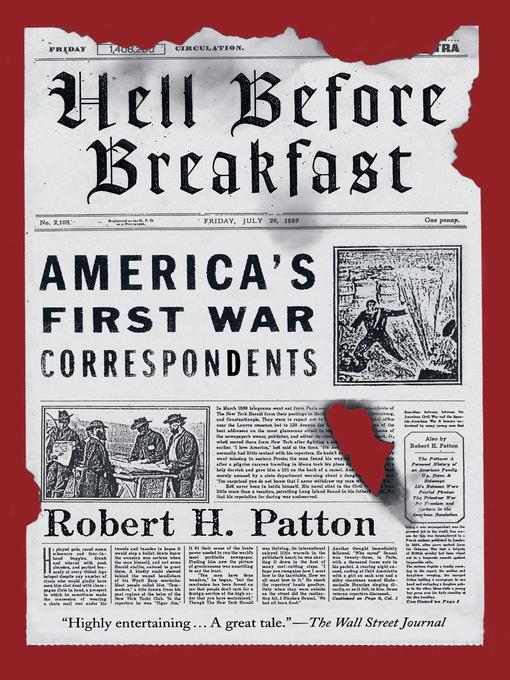
Hell Before Breakfast
America's First War Correspondents Making History and Headlines, from the Battlefields of the Civil War to the Far Reaches of the Ottoman Empire
کتاب های مرتبط
- اطلاعات
- نقد و بررسی
- دیدگاه کاربران
نقد و بررسی

April 14, 2014
Acclaimed historian Patton (The Pattons) focuses on the war correspondent persona and the band of bold adventurers who earned their keep on the frontlines in this detailed salute. A first correspondent whose actions provided the template for all who followed, The Times of London's William H. Russell, respected battle, an appreciation that found him in the thick of the bloodiest clashes including the Battle of Bull Run, the Austro-Prussian War, the Franco-Prussian war, and the Russo-Turkish war. In a no-frills, straightforward narrative, Patton describes the backgrounds of the early pioneers, John Russell Young, George Smalley, Holt White, and Henry Villard, who embraced armed conflict and its horrors, while feeding their dramatic observations to The New York Herald and The New York Tribune. The American publications dueled with each other, such as when Smalley opposed sending untried reporters into the battlefield, instead preferring two experienced correspondents dispatched to each army's headquarters. Some excitement is generated with the sections of the wild and brilliant career of American painter-war correspondent Frank Millet, who bravely covered the 1877 war in the Ottoman Empire. Patton's tribute to these battlefield scribes revives an understanding of why these men mattered.

March 1, 2014
Exploration of some of the unsung early war correspondents in New York and London who created the model for vivid prose and humanitarian alarm. With the installation of a trans-Atlantic telegraph cable connecting America and Europe in 1858, the race for newsgathering took off, while the eruption of the Civil War shifted reader interest from local scandal to "the exclusive battle dispatch that could be issued in an extra edition and hawked on the street at great profit." Patton (Patriot Pirates: The Privateer War for Freedom and Fortune in the American Revolution, 2008, etc.) captures the gritty, wild-eyed quality of trailblazing early newspapermen like John Russell Young, who made his name covering the Battle of Bull Run, and the Ohioan Januarius MacGahan, along with their exacting editors--only two women are featured: one is MacGahan's comely Russian wife, the other a wealthy humanitarian widow, Emily Strangford, who met the reporter while setting out to help victims of Turkish-Bulgarian violence in 1876. All the New York newspapers--e.g., James Gordon Bennett's Herald, Horace Greeley's Tribune and Henry J. Raymond's Times--competed with one another for the scoop, learning the value of "creating news instead of waiting to record it"--e.g., the Herald's sending the rookie reporter Henry Morton Stanley to Central Africa in pursuit of the incommunicado missionary David Livingstone. MacGahan and other American expat correspondents in Paris stumbled on the Franco-Prussian War; he was horrified by the bloody insurrection, taking pains to characterize the violence fairly in his emotional dispatches for the Herald, for which he was highly praised. Another visionary correspondent was the extraordinarily talented artist and writer Frank Millet, who plunged into covering the Russian-Turkish War of 1877 by crisscrossing Central Asia during an era of difficult land travel and illustrating his essays with tremendously moving sketches of the bloodied and wounded. These correspondents became heroes of their time and doubled at times as capable explorers. Densely researched, swift-moving account full of fighting detail.
COPYRIGHT(2014) Kirkus Reviews, ALL RIGHTS RESERVED.

March 15, 2014
Between 1860 and 1910, when the world was engaged in conflicts from the U.S. Civil War to the Spanish-American War, adventurists and enterprising war correspondents, many of them now lost in obscurity, brought the news to the American public. Patton records the spirit of adventure as the new technology of the telegram allowed intrepid reporters to share the news more widely and faster than before, influencing political decisions about war as the public judged the effectiveness of war strategies and the wisdom of some conflicts. Times of London reporter William Howard Russell's accounts of the carnage of the Crimean War prompted Florence Nightingale to bring volunteers to the front to treat wounded soldiers. Others, including Henry Villard and the New York Tribune's George Smalley and Holt White, were among the war correspondents who inspired writers and statesmen from Rudyard Kipling to Theodore Roosevelt. Patton offers a fascinating cast of characters as he details major conflagrations and social and technological changes amid the gore of war and the prose of reporters of another era.(Reprinted with permission of Booklist, copyright 2014, American Library Association.)

























دیدگاه کاربران